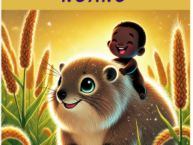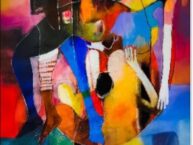 Abu Amirah finds pleasure in the written word because of the ability to lose himself in an infectious world filled with characters begging to come to life, metaphors, muse and madness; and amid all this, the power to give the reader permission to laugh, cry, love and hate!
Abu Amirah finds pleasure in the written word because of the ability to lose himself in an infectious world filled with characters begging to come to life, metaphors, muse and madness; and amid all this, the power to give the reader permission to laugh, cry, love and hate!
Mutembei keenly observes Mombasa beneath the inexorable sun, a town clinging on its designated part on the warm palms of Mama Africa, trying- like any other metropolitan- to curve a niche for itself against an absurd level of expectations-
Youthful dreams smashed against the jutting rocks on the shores with a promise that others who dare share connatural dreams will suffer the same pitfalls and abstraction.
An Ocean the smell of slavery, broken promises, Portugal and Vasco Da Gama’s piss, washing away hopes and aspirations, so much so that new generations have nothing which resembles their ancestor’s footsteps to fit or surpass.
Swahili Nights skewered skillfully, ducking between ghawha cups, rising up with the scented Oud which bears the prosody and cadence of Arabic nights, to meet an enthusiastic, vibrant culture; a culture that thrives on the backs of ancestors who look on with less alacrity.
Yet beneath all these and the uncanny ability of the aforementioned fireball to offer a sacrificial, ephemeral lamb to camera lenses in the form of unforgettable sunsets and adorable sunrises, the city thrives and lives to make a better tomorrow from a wounded past.
The view is as breathtaking and contagious as the touch of a fleeing lover, who in her routine disappearances leaves one with the anticipation that indeed tomorrow, if it ever comes, will hold better and perhaps more compelling narratives than yesterday.
“You know something, Mutembei?” Nasoro quipped.
“Tell me,” Mutembei said, pushing an inverted bottle top across the board. It made a screeching sound.
“While everything spikes out with age, your game funny enough seems to deteriorate,”
“Is that so, that everything grows with age?” he asked.
“Naam, Kila kitu,” Nasoro remarked. “Everything apart from your wife’s love for you. That, my friend, never grows!”
“Is that an admission that you are lonely because your wife no longer loves you?”
“Which one? I have three wives, remember!” Nasoro winked.
“Compounded loneliness,” Mutembei said. “No wonder you have been so grumpy lately.”
Nasoro grunted, tapping on the draft board with his piece, striding over Mutembei’s cowering pieces, three of them, ultimately holding them hostage with several others on his side.
Mutembei winced. How will I ever beat this old timer?
“It reaches a certain point in life when you can no longer say that your partner loves you or vice versa; it is more than love, perhaps we could call it…” pausing a moment, piece held in the air like a drone, to study his opponent’s apparently weak position on the board, “a sympathetic appreciation of the role that you play in that partnership, and the innate knowledge that that person, in spite of peculiar characteristics they may possess, is the right one for you.”
He knew all about Nasoro’s three marriages from which he had been wonderfully blessed with fourteen children, three miscarriages and four cats; and he had maintained a perfect balance of sanity throughout. Mutembei figured he would have lost his mind already if he was in his shoes or bed for that matter; but Nasoro kept growing stronger with age!
“Nyumba ndogo raha,” Nasoro used to tell him. “Ever since I got the third I feel like I am indeed growing younger. She makes me honey and milk every morning my friend, now am stronger than an ox from Rift Valley!”
“Honey and milk?” Mutembei would ask, almost always over a game of draft under the ageless, timeless shadow of a Makuti roof. “What’s special about it?”
“Aah,” Nasoro would say. “While you younger men have your vigor and vitality, we older men have our secret weapons. Or why do you think young women prefer old men!”
“Your wealth and the endearing prospects of a good inheritance?”
“No. Start taking honey and milk and you will realize why!”
Mutembei had first come to Mombasa in the infant nineties after dropping out of high school courtesy of Mwiti, a friend of his who had gotten into the Miraa business while he was still very young; and he had whispered into Mutembei’s ear of exponential, endless profitable exploits in Mombasa, vast as the ocean itself.
“Take for instance the last trip I made on Tuesday,” Mwiti had explained. “I only had two sacks of Miraa but made enough to add the tally to four sacks for my next trip this coming weekend. Hii maisha yanataka ujanja, Vaite. Now I have loyal customers already who are never content until they get my Khat.”
Mutembei nodded slowly, the sheer weight of his thoughts in the face of such profits weighing down his chin.
“In case you haven’t noticed,” Mwiti had continued. “I have built a decent house for my parents already and soon I will be moving out of my Thingira!”
“Has your father given you a piece of land to build on already?”
“Kitambo sana!” Mwiti said, throwing his hand back to give an impression of how long ago he got his land. “You know once you prove that you are a real man, your father will welcome you into manhood by giving you a share of his property so you can be your own man.”
Mutembei’s father was a primary school teacher and it went without saying that he wanted his son to follow suit. He was sitting on a twelve acre piece of land which he had inherited from his deceased father, and Mutembei did not need a logarithm table to calculate how much land he stood to inherit
“I will be getting married soon too,” Mwiti had announced.
“Married?” asked a shocked Mutembei.
“Sindio,” Mwiti shrugged. “What else is there for a man making his own money to do other than get married?”
“But you are still very young!”
“That’s where you are wrong my friend,” He patted him on his shoulder. “Money makes you mature quicker because you have the power in your pocket!”
Mutembei remained restless for the entire week as he pondered over Mwiti’s good fortune. True, he had built a very good house for his parents, which so happened to be the envy of all villagers. Women talked about it in their Chamaa meetings while men discussed it amid sagacious nods in their drinking dens.
He thought about school and his father’s dream that he would too become a teacher one day, though that was hardly what he wanted to do with his life. He considered a teaching profession to be too Napoleonic, ridiculously dwarfish and an unjustly rewarding activity which would without doubt impose upon him a case of chronic dissatisfaction at the thought of living a life without purpose- inhaling chalk dust his entire life to cough out teachers and lawyers, pilots and doctors, more teachers and blue and white collared robbers, all of whom end up with more fulfilling lives than him. Ultimately he would probably die from chest infection.
Such a sorry life!
He desired to be a writer because he knew he had a way with words. Prose and poetry made his heart race and on many occasions he had placed himself in the shoes of great wordsmiths like Edgar Allan Poe, Mark Twain, Charles Dickens and Jane Austen though he had struggled a bit with Sense and Sensibility. Writing was life, capturing every moment in it and immortalizing it for eternity in the capsule of an adjective and it was through it that he could create a world of his own filled with wordy rainbows flawlessly pinned to the sky.
“Writer kitu gani?” his father had spat angrily when he mentioned his desired brand of lunacy. “How do you expect to make a living from that?”
“By writing!” he answered too fast. The words were wiped clean from his mouth with a slap.
“That is not a career I want for you,” his father cautioned. “Being a teacher is God’s way of giving you the power to shape the lives and destinies of the people you teach and the joy and satisfaction comes from seeing the product of your labor become something meaningful in life. Nothing good ever comes from being a writer.”
But there is father, he wanted to point out. Prolific writers like Ngugi was Thion’go have made it big and ironically they are now teaching the native English speakers to use their language. And Meja Mwangi, Achebe, Soyinka, Grace Ogot and David Mailu. I want to follow their path, father, I really do. My satisfaction will come when I see the words I create blossom into splendid flowers that everyone smells and enjoys in this path of life…
But the slap had rendered all his arguments meaningless.
“So, when are you getting married?” Nasoro asked him as he rearranged the pieces on the draft board again for a third round of decimation, plunder and victory.
“Not anytime soon.”
“Why, doesn’t your Mzungu darling want to get married anymore?”
“We will get married. Everything in its due time.”
“Of course,” Nasoro said, nodding. “But if you permit me I can talk to my fellow Wazee and we can get a good Swahili girl for you. Your Mzungu shows no signs of ever coming back.”
Mutembei laughed.
“You are growing older as the days pass and I think it’s time you forget about your blonde-haired fiancé.” Nasoro explained. “Besides, you have lived among the Swahili people long enough to warrant you the right to marry here.”
He knew Nasoro was right and it had become clear to him too that Cindy had probably forgotten him. They had had what seemed to be a very promising future with a possibility of settling in Delaware once they got married; she to continue with her Documentaries and painting, while he pursued writing in the hope of publishing an anthology-poetry or otherwise, someday.
Cindy had left with a bearded American photographer- with a camera lens the size of a Giraffe neck, for the Mara and Serengeti to film Cheetahs and Lions for National Geographic and that was the last he saw of her. Not that she was mauled by a Lion or anything, she just fell head over heels in love with Fauna and memories of him were replaced with an undying, rapacious fascination with nature. The emails no longer bore any semblance of the passionate fire they once shared, but of images of animals doing mundane things like licking their paws, with the same being emailed to a thousand other people too!
“But having lived here still doesn’t give me that exclusivity to marry a Swahili woman,” he said. “The Swahili are a very cultural people who prefer marrying from within the set up. Far as marriage is concerned, I will still remain an outsider.”
“How can you be an outsider when you break bread with them?”
“Breaking bread is a universal human need-”
“Then if you can’t beat them, join them!”
“Am not sure I follow-”
“Become a Swahili,” Nasoro said with no hint of his regular jokes.
“Ostensibly yes, but I cannot rearrange my origins and genetic impressions to make them Swahili-”
“Leave that to me,” He sighed as he signaled the start of the decimation on the draft board.
Mutembei imagined many things. Living among the Swahili was one thing but to become one was a different thing. He still swore unmatched allegiance to his upcountry home in Meru while at the same time fighting a raging emotional battle, trying to reconcile with his father’s spirit which seemed to etch itself on every thought he had of home. He just couldn’t bid farewell to his spirit without an appropriate way of appeasing it.
“Anyone who drops out of school to pursue foolish dreams is not worthy of being my son,” his father had warned him when he broke the news that he would be dropping out of school to start a Miraa business in Mombasa. “Never set foot in my property ever again. In fact, don’t even come to bury me when I die!”
And his father had remained adamant throughout the years in spite of his mother’s constant pleas to tone down. He proved his seriousness when he turned Mutembei down after he had been arrested in Mombasa for allegations of being a member of an outlawed sect which sought secession from what they called Bara, Mainland Kenya. Were it not for his mother, Mutembei would have spent the better part of his youth in jail, and just like that the feud between father and son, which sadly lasted until the former’s death, began in earnest.
Part of reconciling with his father’s spirit led him to start writing a book about a brilliant boy who as a result of peer pressure denounces his citizenship on Planet Earth for a promise of a better life on Mars with a blue-eyed woman who jumps ship and leaves him to traverse the Galaxy alone with only a rodent for company. Then it becomes a rat race, each trying to eat the other for survival, but the boy cannot bring himself to nibble on the rodent’s tail, yet the situation prevails upon him to do so. The protagonist in his book is called Joshua and he hopes that through Joshua’s journey he would finally put his father’s ghost to rest.
“Take me through the basics of becoming a Swahili,” He asked Nasoro who was busy as always studying his next decimation moves on the board.
“Oh, it’s quite simple,” He explained. “First lesson you need to learn is how to tie a Sarong. Second…”
“A Kikoi?”
“Yes. Why?”
“The last time I tried wearing that thing it started slipping from my waist while I was talking to a lady-” He laughed. “That would have been utterly embarrassing!”
“Your problem is that there is just so much of a villager in you that I have given up hope of ever eradicating it. How can you wear a Kikoi with no underwear?”
“For the record I had underpants. Let’s skip the first lesson, not applicable to me unless I wear them with suspenders. Second?”
“Second you become a Muslim.”
“Do I have to?” His heart skipped a beat.
One of the reasons he was allegedly charged with being a member of an outlawed sect was his friend Mwiti, who had joined several of such groups, ending up- as rumor had it, in Somalia as an Al Qaida affiliate fighter. The Police had been on Mutembei’s back for quite a while, closely associating him to being a member too- an accusation he escaped through sheer luck.
And his fear was that being a Muslim, much as terrorism wasn’t a Muslim monopoly, would draw the Security Agents’ interest in him again. He had heard stories from Mombasa residents-victims of arbitrary detention and renditions on terrorism-related charges, of the torture that they had gone through.
Water boarding.
Electric shocks.
Crushed dreams and genitalia.
He knew he wouldn’t last a day if ever he was arrested. He would rat out anyone and everyone he ever knew, starting with all his phone contacts and friends he remembered from Kindergarten!
“Well,” Nasoro explained. “Not really. There is no compulsion in religion. Your religious allegiance is a matter that only you can decide for yourself.
Nasoro was disappointed. Unbeknownst to Mutembei, Nasoro had a son whom he rarely talked about. He had heard people call him Abu Musa- father of Musa, but he never at any one time asked him who Musa was since none of his children had that name. Ultimately, he just presumed it to be one of the many nicknames his peers called him by. Musa had been recruited as a Somali based fighter, leaving behind a disappointed father- who had been safe in the knowledge that he would leave behind a worthy heir, and a grieving mother who cried for his son every night.
At first he had really blamed the Government for Musa’s recruitment into a terrorist group. It was the Government that had marginalized the Coastal people by failing to provide proper schools and resources to improve the state of learning. Musa had tried on several occasions to get employed, but the more learned, better equipped, more favored upcountry people got the best jobs and the locals like Musa were left to eat the crumbs. Nasoro had eventually quit the finger pointing once he realized that while only one finger pointed at the Government’s fault, three other fingers were inadvertently pointing back at him.
Nasoro loved Mutembei as if he was his own son right from the moment he walked into his famous Biryani Café several years back looking for a job, any job. This was after everything he owned had gone down the drain when he got arrested.
“Fair enough.” Mutembei said.
“But you can still pick a Muslim name to be identified by.” Nasoro masked his disappointment with a smile, a luxury only enjoyed by the wise. “A name like Hemedi.” Had he embraced Islam that very moment he would have gladly married his daughter to him!
“Hemedi?” Mutembei repeated the name several times, whispering it, savoring it in his tongue, perceiving of it in upper and lower case letters, as a signature on a bank cheque, trying to match his core values to it. “Sounds alright,” he said. “But isn’t the name common only among the people from Lamu?”
“So what?” Nasoro pushed a cap on the board. “Will they sue you for using it?”
“I guess not,” Mutembei answered, holding his inverted bottle top to jump over Nasoro’s pieces, holding the vanquished ones hostage on his lap. “But don’t you think it’s odd a dark skinned guy like me answering to that name?”
“I didn’t know names had a tribal or pigment affiliation too. I thought that was only a reserve for our political selves!” studying the draft board. “Okay, choose one of your own liking then,” reeling from the shock of having so many pieces taken at once.
“Third lesson?” It was his time to study and anticipate Nasoro’s move.
“Identify wholeheartedly with the Swahili culture, history and problems.”
He could easily identify with the culture but history and problems were a different brew of Kahawa. The culture had already adopted him and he had no problems with that. His own history with his father and the problems he went through trying to reconcile with him prior to his death kept him from adopting other people’s problems.
He would only become Swahili after he had adequately appeased his father’s spirit, giving it an appropriate send off. Joshua was the vessel he was using to bridge the gap between him and his senior’s spirit and he would wait until Joshua had fought his battles in Space- which hinged on a very thin line between precaution and paranoia, so he could fight his when he got back to earth.
Until then, he would only be partly Swahili.


